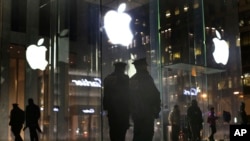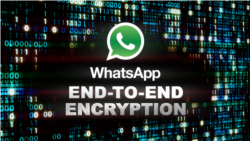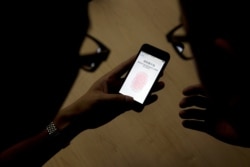A long-running battle between U.S. law enforcement and the technology industry was pushed to the forefront again this week when U.S. Attorney William Barr criticized Apple for refusing to open two iPhones belonging to a Saudi aviation student at the Florida naval air station who killed three sailors.
At issue is whether public safety concerns, such as investigating whether the shooter worked with others, should outweigh the benefits of encryption, which allows people to trust that their personal privacy and security are protected while using the technology.
Some law enforcement agencies and lawmakers argue that smartphones and communication technology, such as Facebook’s WhatsApp, which is built with strong encryption, should also come with a “back door,” so that police can gain access.
"We should be able to get in when we have a warrant that establishes that criminal activity is under way,” Barr said Monday.
Tuesday afternoon, U.S. President Donald Trump echoed Barr's concerns, tweeting: "We are helping Apple all of the time on TRADE and so many other issues, and yet they refuse to unlock phones used by killers, drug dealers and other violent criminal elements. They will have to step up to the plate and help our great Country, NOW! MAKE AMERICA GREAT AGAIN."
Breaking into a gunman’s phone
The issue came to the forefront in 2016 when the Justice Department sued Apple to gain access to the information on the phone of a gunman who had killed 14 people in California. The government ultimately paid another company to gain access to the phone.
This time, the government approached Apple only after it failed to open the shooter’s phones, even after asking outside firms, according to reports.
As consumers rely even more on their devices and digital communications, privacy and security becomes increasingly important, tech companies said. Law enforcement can get data from the phone that has been backed up by the company’s cloud service, but Apple’s encryption means data that lives only on a person’s phone can only be accessed by someone with the person’s passcode.
"Our phones are relatively small and they get lost and stolen," said Jane Horvath, Apple’s senior director for global privacy, at a panel at the Consumer Electronic Show last week. "If we're going to be able to rely on our health data and finance data on our devices, we need to make sure that if you misplace that device, you're not losing your sensitive data."
A backdoor to police and hackers
In addition to WhatsApp, which encrypts communications, Facebook is also considering end-to-end encryption on Facebook Messenger and Instagram Direct so that no one other than the sender and recipient can read a message.
Civil liberties groups and cybersecurity experts argue that creating backdoors for law enforcement would weaken users’ security and personal privacy by giving hackers a way in as well. “
Apple is right to provide strong security to its users, requiring a passcode or biometrics to unlock a phone,” said Kurt Opsahl, the general counsel at the Electronic Frontier Foundation, a digital rights group.
Barr’s “request that Apple re-engineer its phones to break that security imperils millions of innocent Americans and others around the globe, and is a poor trade-off for security policy," Opsahl said.
Riana Pfefferkorn, associate director of surveillance and cybersecurity at the Center for Internet and Society at Stanford Law School, said people should consider potential global implications of creating a hole in a technology’s encryption. “
There's no way to build access for the good guys, such as the police, that couldn't be discovered by the bad guys, like criminals, or one nation state hacking another,” she said. “If the U.S. demands it, then every government in the world will demand the same thing.”
In 2018, Australia passed laws that would give law enforcement the ability to require tech firms to give access or change their technology so police can have access. U.S. tech firms, such as Amazon, have criticized such laws.






